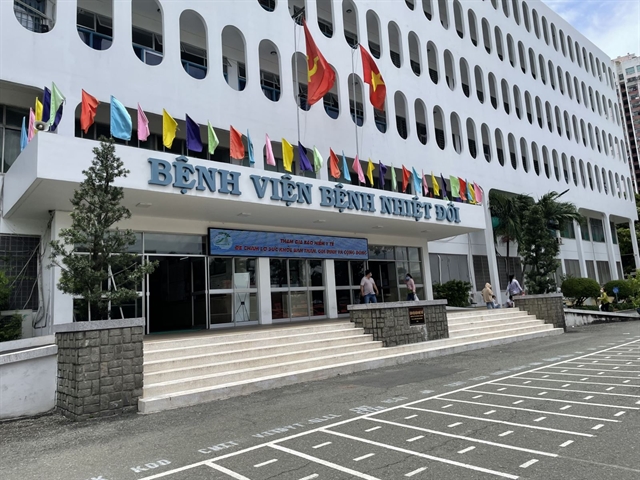 Society
Society


|
| The HCMC Hospital for Tropical Diseases, where cases of mpox were identified in the city. VNA/VNS Photo Đan Phương |
HCM CITY A total of 56 cases of mpox (monkeypox) have been identified, including 2 cases imported in 2022, in 7 provinces and cities, with one fatality in Hồ Chí Minh City.
The average age of patients is 32 (18 to 49), predominantly male (92.9 per cent), with a tendency towards male-to-male and bisexual (MSM) relations at 78.6 per cent, heterosexual (8.9 per cent); approximately 63 per cent of mpox patients are also HIV-positive, and 46 per cent have contracted other sexually transmitted infections.
The Ministry of Health (MoH) acknowledges that this is a newly recognised disease in our country. As the pathogen has infiltrated the community, it is likely that Việt Nam will continue to register new cases, especially in major cities beyond HCM City.
Continuing the implementation of the Prime Minister's Directive to proactively monitor mpox, promptly implement disease prevention measures, and minimise the number of infections and deaths, the Preventive Health Department of the MoH has issued a document requesting the directors of health departments in provinces and centrally-run cities to direct and implement monitoring and early detection of mpox cases and sources of transmission.
Accordingly, provinces and centrally-run cities are urged to intensify active surveillance at healthcare facilities, community-based monitoring, and at border checkpoints (if applicable). This surveillance should be integrated with HIV/AIDS prevention activities, monitoring at gynaecological and dermatological clinics, public and private healthcare facilities providing HIV/AIDS services (HIV testing, pre-exposure prophylaxis (PrEP), antiretroviral treatment (ARV)) to detect cases, clusters of cases, and sources of transmission, thus providing counselling, care and treatment services.
Localities should manage disease cases and contacts to prevent further transmission within the community. They should also focus on preventing infection among healthcare workers, provide advice, and conduct HIV testing for patients and partners of mpox patients.
For suspected cases, it is necessary to collect samples for testing, contact, and send them to the Pasteur Institute/Epidemiology and Hygiene Institute of the region for examination and diagnosis.
The Preventive Health Department also suggests that provinces and cities conduct training for healthcare workers on monitoring, care, treatment and prevention of mpox infection.
At the same time, they should proactively develop and update plans and scenarios for prevention and control according to situations, to be ready to respond when the disease occurs in the area. This includes preparing drugs, equipment, personnel and funds to implement measures for containment, treatment and prevention of the disease.
Additionally, provinces and cities should continue to communicate preventive measures against mpox according to the MoH's recommendations, focusing on high-risk groups. Citizens are also advised to proactively report to health authorities if they experience suspicious symptoms or contract the disease.
To proactively prevent mpox, the MoH recommends that individuals:
1. Cover their mouth and nose when coughing or sneezing, preferably with a cloth or handkerchief, disposable tissue, or the elbow of their sleeve, to reduce the spread of respiratory secretions. Wash hands with soap and clean water or use a hand sanitiser immediately after coughing or sneezing. Avoid spitting in public.
2. Wash hands regularly with soap and clean water or hand sanitiser.
3. Individuals with acute unexplained rashes accompanied by one or more suspicious symptoms should actively contact healthcare facilities for timely monitoring and advice. They should also proactively self-isolate and avoid sexual contact.
4. Avoid close contact with individuals with mpox, direct contact with wounds, body fluids, splashes, and items and utensils contaminated with the pathogen. In cases where someone in the living or working environment is suspected or confirmed to have the disease, it is necessary to inform health authorities for timely consultation and management, without self-treatment.
5. Individuals returning from countries with mpox outbreaks (Central and West Africa) should avoid contact with mammals (dead or alive) such as rodents, marsupials and primates that may carry the mpox virus. Upon returning to Việt Nam, they should proactively declare their travels to local health authorities for advice.
6. Ensure food safety; adopt a healthy lifestyle, enhance physical activity, and improve overall health. VNS




